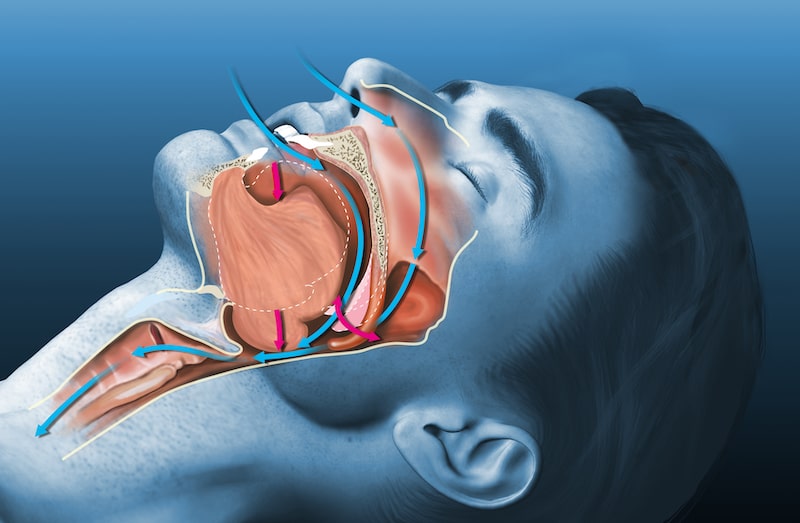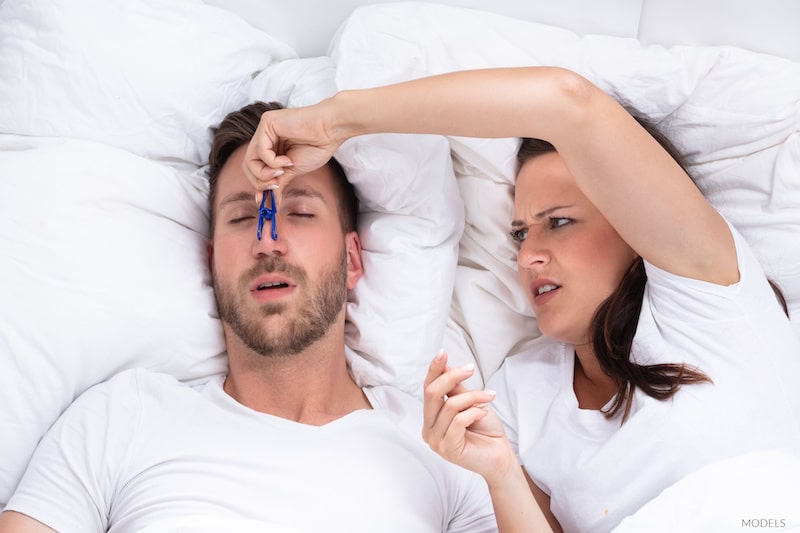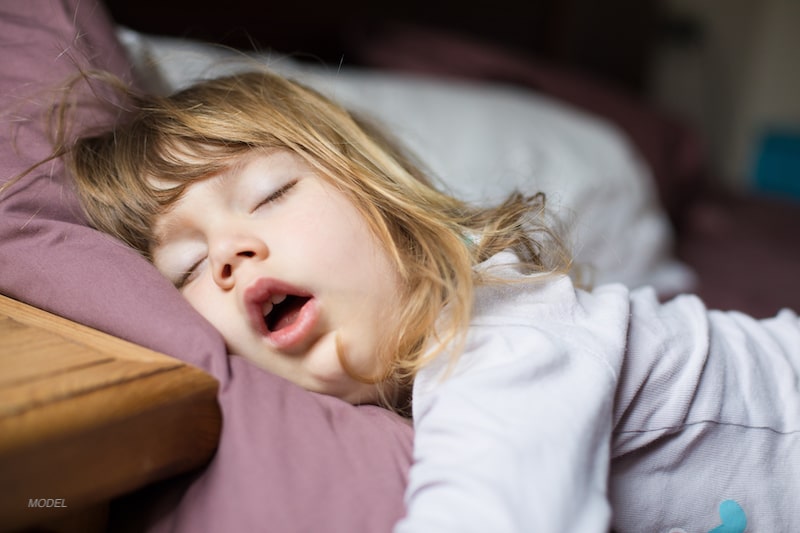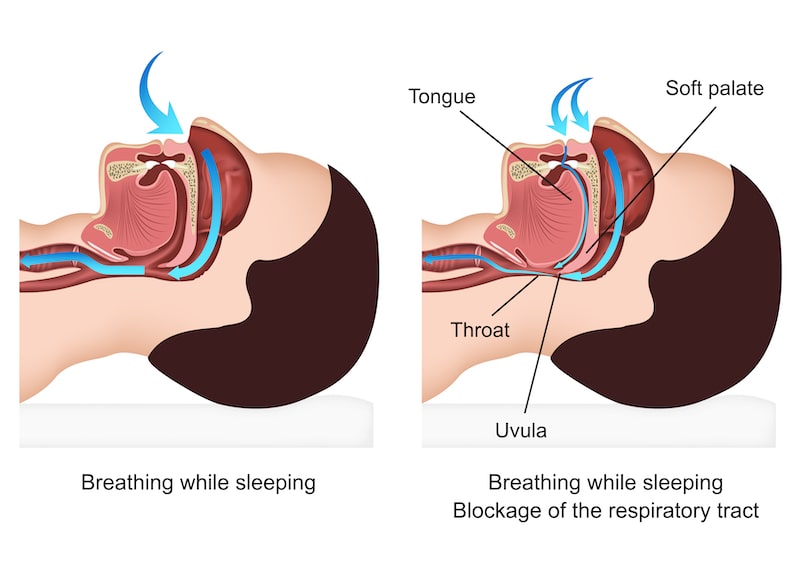How Does Double Jaw Surgery Help Obstructive Sleep Apnea?
Posted August 08, 2022 in Jaw Surgery
7 Minute Read:
Obstructive sleep apnea (OSA) is a condition where the muscles in your throat, tongue, and soft palette relax, temporarily preventing breathing.
While this can be dangerous, there are treatments. One of these options is double jaw surgery.

Can Double Jaw Surgery Cure Obstructive Sleep Apnea?
Yes. Double jaw surgery is documented to be a very effective treatment for obstructive sleep apnea.
There are numerous publications, including peer-reviewed scientific articles written by the specialists at Jaw Surgery Los Angeles and Orthodontic Center Los Angeles*, that demonstrates the efficiency of double jaw surgery in terms of treating and curing OSA.
It is vital to complete a comprehensive polysomnogram (sleep study) and 3D cephalometric analysis and comprehensive clinical evaluation to establish a thorough diagnosis and treatment plan appropriate for your obstructive sleep apnea.
There are also effective non-surgical options — including CPAP, mandibular posture appliances, and ancillary procedures — that can be prescribed for your specific condition.
Can Double Jaw Surgery Improve My Breathing Quality When Asleep and Obstructive Sleep Apnea?
Yes. Double jaw surgery is well-documented in the literature as a very effective treatment for moderate to severe obstructive sleep apnea. There are, however, also effective non-surgical options and alternative treatments.
A specific individual diagnosis and treatment plan will be formulated based upon a comprehensive diagnosis and polysomnogram sleep test.
Double Jaw Surgery and Snoring: What’s the Connection?

Can Double Jaw Surgery Cure Snoring?
Yes. Double jaw surgery — in conjunction with ancillary procedures — can help cure snoring if prescribed and performed by a highly trained and experienced team of surgeons that include an Ears, Nose and Throat specialist (ENT) with experience treating patients with airway obstruction and obstructive sleep apnea.
However, there are also non-surgical options and ancillary surgical procedures that are effective in managing snoring without undergoing double jaw surgery.
Is Snoring in Children or Adults Normal?
Contrary to some popular belief, snoring is not normal in children or adults and is damaging to your health.
Not only is the noise from snoring disruptive to anyone trying to sleep nearby, but the health hazards are two-fold:
- Snoring is indicative that the person snoring is not getting enough oxygen into his or her lungs during sleeping. Insufficient oxygen saturation during sleeping is dangerous to your health and can cause despondency, despair, depression, cognitive impairment, memory loss, impotence, diabetes, heart disease, stroke, and a series of progressive serious health hazards.
- Snoring also is disruptive to a person’s natural, deep, restful sleep. Snoring is usually an indication that the airway in the nose or behind the tongue (retroglossal area) is partially blocked or narrow.
While awake, even if your airway is slightly narrower than normal, the muscles around the airway are able to compensate for oxygen saturation. While awake, this is normally 100 percent.
As we relax and go into the various stages of peaceful sleep, people with a narrow or partially blocked airway can actually stop breathing for five to 10 seconds (due to a pressure differential inside and outside the body, when the diaphragm — used to breathe — contracts and expands.)
There is an oxygen sensor in the brain that can sense a lack of oxygen during sleeping and it causes an automatic arousal, (a short period of forced breathing) to get oxygen into your lungs.
This arousal causes you to go into a lighter stage of sleep.
There are four major stages of sleep, R1, R2, R3, and R4.
R4 is a deep restful stage of sleep — called REM sleep — and is necessary for optimal rejuvenation and health every night.
When snoring causes arousal, it disrupts our deep restful sleep and puts us into a lighter stage of sleep that is not as restful or regenerative.
Snoring can cause multiple arousal episodes throughout the night.
The arousal does help force the oxygen into the lungs, but each arousal causes us to go into a lighter stage of sleep for a period of time, so the quality of sleep is affected.
We are not typically aware of these arousal episodes since we are sleeping. However, when we awaken after seven to eight hours of sleep and feel tired, this becomes a problem.

Do You Feel Fully Rejuvenated After Seven to Eight Hours of Sleep?
Most adults think that tiredness upon waking is related to stress, diet, lack of exercise, or other life complexities or anxieties.
Although these can impact restful sleep, the most common reason for not feeling fully rejuvenated upon waking in the morning is a lack of oxygen saturation.
Fortunately, oxygen saturation can easily be measured using a medical grade overnight sleep test.
This test (called a polysomnogram) can be mailed to you and done in the comfort of your own home. A polysomnogram can also be performed at an overnight sleep center.
Patients with complicated medical histories or severe medical conditions will be advised about the advantages of testing at an overnight sleep center, including patients that may have central sleep apnea.
Fortunately there are very effective treatments (non-surgical and surgical) that will allow you to get healthy restful sleep, so important to your overall health and well-being.
Alternatives to the Common CPAP Machine and Understanding How Double Jaw Surgery Can Help
Is CPAP Effective for Obstructive Sleep Apnea?
While CPAP machines are an effective treatment for OSA, many patients cannot tolerate CPAP or don’t like wearing a CPAP.
Some patients will use it for a few hours and then take it off or will wake up in the morning and find that their CPAP is off.
Not wearing a CPAP for any length of time at night while sleeping, even as little as not wearing it for one hour, is damaging to your health.
During the time you are not using your CPAP, you are not getting sufficient oxygen into your lungs, and this will adversely impact your health and well-being.
The impact is cumulative.
Are There Any Alternatives for CPAP?
Many patients who cannot tolerate CPAP or do not enjoy wearing a CPAP are looking for an alternative.
Orthodontic Center Los Angeles, Sinus Center Los Angeles, and Jaw Surgery Los Angeles offer patients surgical and non-surgical options and alternatives to CPAP.
Options include surgical and non-surgical options.
Often, patients who are traveling do not wish to take their CPAP with them and prefer to wear a mandibular posturing appliance that can be individually prescribed and made. Patients often consider this much more comfortable, especially while traveling.
The mandibular posturing appliance is custom-made for optimal comfort. This is to be worn much like a mouthguard while sleeping.
It is important that a mandibular posturing appliance is prescribed and made by a team of specialists with extensive experience in obstructive sleep apnea and orthodontics so that it is effective, and comfortable.
Does a Mandibular Posturing Appliance (MPA) Affect the Bite, or Can It Create a Bad Bite (Malocclusion) ?
Orthodontic Center Los Angeles specialists have developed a sleep apnea appliance protocol and series of appliances that are made to help control obstructive sleep apnea without creating a bad bite or malocclusion.
The protocol developed at Orthodontic Center Los Angeles can include a series of appliances that can actually straighten teeth and correct your bite and improve your smile at the same time as controlling obstructive sleep apnea.
A series of appliances are custom-made at Orthodontic Center Los Angeles’s on-site, state-of-the-art laboratory and are to be worn at night to control obstructive sleep apnea. At the same time, these appliances progressively improve the position of your teeth and bite, if needed.

I Do Not Want to Use and Cannot Tolerate a CPAP Machine for Obstructive Sleep Apnea. Can I Do Double Jaw Surgery Instead?
Double jaw surgery is an effective treatment for obstructive sleep apnea when diagnosed and treated optimally in conjunction with appropriately prescribed ancillary surgical procedures and best practices.
Understanding Obstructive Sleep Apnea and Central Sleep Apnea: What’s the Difference?
Central sleep apnea is different to obstructive sleep apnea.
In central sleep apnea, the brain does not function correctly and does not send the correct signals to your muscles that impact breathing.
Does Double Jaw Surgery Cure Central Sleep Apnea?
No. Double jaw surgery can only cure obstructive sleep apnea
Central sleep apnea is a relatively rare disorder that can be diagnosed by a team of sleep specialists with the aid of an overnight polysomnography performed at an overnight sleep center. Iif correctly diagnosed, this can be effectively treated.
Suffering From OSA? Contact the Specialists at Jaw Surgery Los Angeles Today!
To learn more about how the specialists at Jaw Surgery Los Angeles can help your OSA, contact us today by calling (310) 361-3363 or filling out our online contact form.
*American Association of Oral and Maxillofacial Surgeons Journal 69:663-676 by Stephen Schendel, MD, DDS, Nelson Powell, MD, DDS, and Richard Jacobson, DMD, MS.
American Journal of Orthodontics: Obstructive Sleep Apnea, Surgery vs non Surgery point and counterpoint, by Richard L Jacobson DMD, MS et al and Airway Growth and Development by Steven Schendel DDS, MD, Richard L Jacobson DMD MS and Sadri Khalessi PHD.
